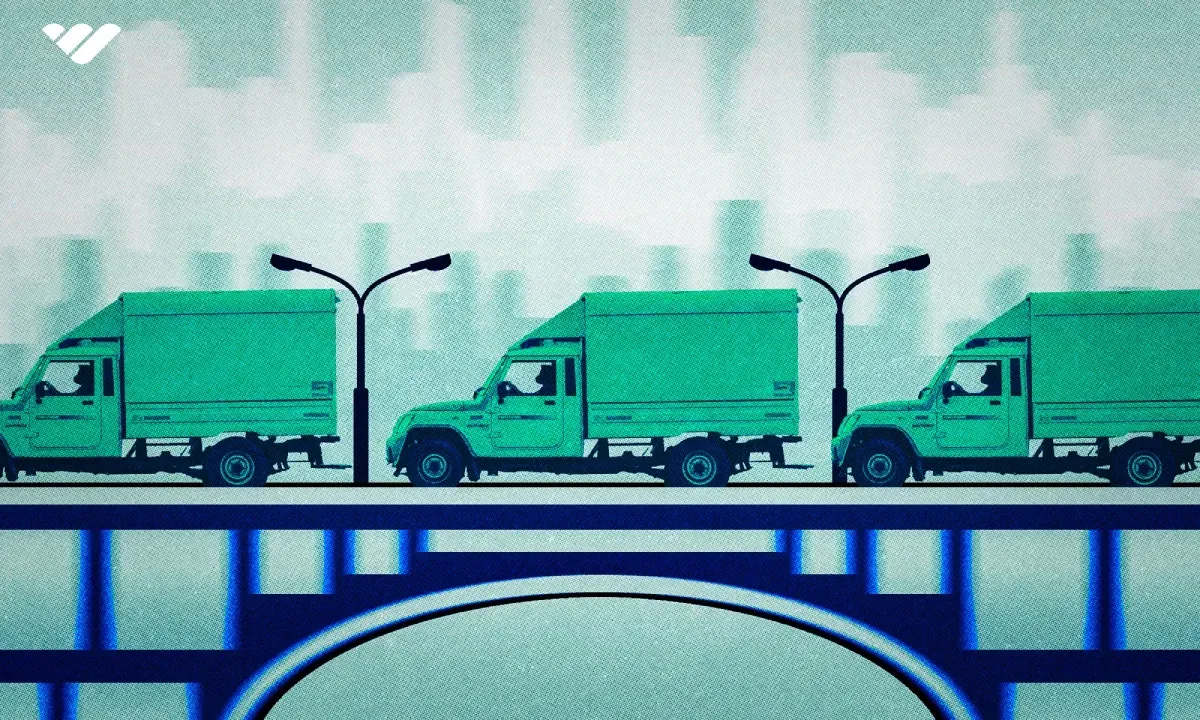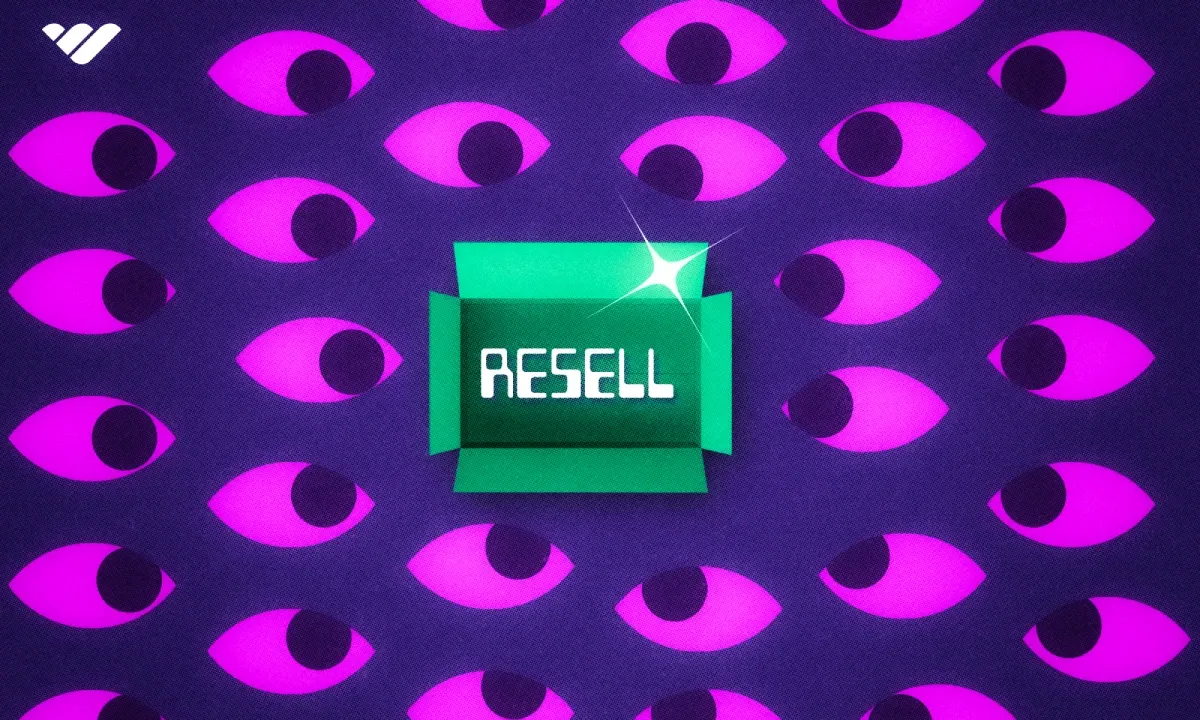Do you want to become a reseller? Read this guide for the 10 steps that you can take to start your reselling business.
Key takeaways
- Choosing a specific niche where market demand overlaps with your personal interest gives you a competitive edge over casual sellers.
- Starting with proper business registration and reliable wholesale suppliers builds the foundation for scalable, profitable operations.
- Reselling offers low barriers to entry but requires constant adaptation to trends and market changes for long-term success.
Making your entry into reselling can be a rewarding and exciting entrepreneurial venture, no matter what your previous experience might be. However, like any new business, starting out can also be confusing and overwhelming.
Whop is here to help. In this article, we will go over the steps that you can follow to start a reselling business today from scratch, from developing an understanding of the reselling market all the way to launching and scaling.
Let's get started.
10 steps to start a reselling business

We've taken on the research so you don't have to. Here are the ten steps that you need to take in order to develop, set up, and launch a reselling business.
1. Understand the reselling market
Long-term success in any entrepreneurial venture is determined by how strong the foundation is, and this is especially true with reselling.
Gaining an understanding of the reselling market is a crucial first step as this will give you the confidence and the knowledge that you’ll need in order to move forward in the right way.
Here are some tips that you can use to gain a better understanding of the reselling market:
- Understand pop culture and fashion trends
Much of the market is driven by what’s in the overall cultural narrative. People’s interests drive where they put their money at, so understanding current trends will allow you to find related products to resell. You can use tools like Google Trends to get a quick overview. - Check out popular products that are being resold
By checking out popular products that are being resold, you’ll gain a better understanding of the reselling market as a whole and also which products might interest you specifically. For a full guide with products that you can resell, check out our list of the best here. - Find and analyze competitors
When you come across specific products, you will find specific sellers who may be your competition if you decide to sell in their niche. Once you’ve found them, analyze their business model to see if you can replicate it and if that is something you even want to do. An example of doing this is finding a seller on eBay or Amazon and seeing what products they’re selling and how much business they seem to be doing, including potential profit margins.
2. Decide on a niche

While reselling is incredibly broad, the most profitable resellers who are able to stand out and attract loyal customers are those who pick a niche. When picking a niche, consider an area that has a strong overlap in market demand and personal interest.
Once you validate the market demand of a niche that you’re interested in, you should pursue a reselling business in this category as you will already have an advantage over the casual seller who might not have the interest or bandwidth to cover all aspects of the niche enough to truly resonate with your audience.
Picking a niche that you can master will significantly enhance your branding, the efficacy of your marketing efforts, and the odds of you establishing a long-term business with loyal customers.
3. Check local laws and regulations and register your business accordingly
It is best to set up your reselling business properly from the very beginning, regardless of your initial goals. That way, when you scale to significant income levels, you're ready to deal with the workload. It’s easier to do this from the very beginning instead of waiting until it’s too late and messy to do so.
While the specifics will vary by region, you can simply search your location and any requirements for resellers, including specific regulations, licenses, or tax obligations related to your intended niche. You can use a website such as the Small Business Administration (SBA) in your region.
After you’ve reviewed all of the laws and regulations, you can formally register your business so that you’re compliant and ready to get launched and scale as high as you’d like without issue.
Recommended next read: What is reselling and is it legal?
4. Choose your business model and fulfillment method

When settling on your business model, you’ll want to choose how you will fulfill the product in the most efficient and cost-effective manner.
Your business model will most likely be ecommerce-based, as selling in person requires too much overhead and upkeep for a beginner. One such model might be focused on maximizing profits with retail arbitrage, while another might be dropshipping.
The fulfillment model you choose determines how your product is stored, packed, and shipped. It will vary depending on what you’re selling, where your customers are, and which platform you’re using to sell your product, if any.
Starting out, it’s often best to fulfill the product entirely on your own, as this allows you full inventory control and a more direct way to keep an eye on product quality and establish customer relationships. However, if you are a dropshipper or if you are an Amazon FBA seller, the product will be fulfilled for you, which is often easier as you scale. The convenience of outside fulfillment can sometimes be outweighed by potential downsides which include lower profit margins and more complicated logistics.
Recommended next read: What is ecommerce fulfillment
5. Find reliable suppliers
One of the keys to your reselling business is finding a reliable supplier that gives you a profitable source of inventory. Now that you’ve picked a niche and registered your business properly, you’re able to go out and search for suppliers.
Sometimes, a supplier might be as simple as the clearance section of a store that you frequent, but other times, it might mean finding a wholesaler. Dealing with a wholesale supplier will provide numerous benefits, including getting a bulk discount and a reliably steady source of inventory.
Getting in with a wholesaler requires developing a relationship. You can use wholesale directories, attend trade shows, or contact brands directly to ask if you can wholesale their products.
Recommended next read: How to find wholesalers as a reseller
6. Create your online storefront

As a reseller, you will likely have chosen ecommerce as your primary business model, so making your online storefront is the next step after you’ve found a good supplier for your reselling business. One of the few cases where having a physical storefront might be better is if you have a vintage clothing consignment and reselling store, but even some of the best vintage clothing stores are online.
You’ll want to have a professional website to direct your customer base to so that you’re taken seriously and can charge good prices.
One way of launching online without needing to make your own storefront is to sell on an existing platform such as Amazon or eBay. Another route you can take is creating a website underneath your own brand, which can be done quickly by using a SaaS ecommerce platform. Your online store and the user experience is a defining factor for your brand’s reputation and ability to scale, and it can be made by choosing a good platform and designing a great website.
7. Set up your payment system
While this is a quick step, setting up your payment system correctly from the beginning is crucial. You want to use a payment system that is secure, reliable, and convenient for your customers.
As an ecommerce store owner, you will be working primarily with payment gateways.
Choosing the right one for your website can have a great impact on your customer experience and the bottom line of your business. For specific ecommerce payment solutions that you can use for your reselling store, check out: The Best SaaS Payment Gateways
8. Finalize your business plan and marketing strategy
Now that you’ve laid the full groundwork for your reselling business, including which product you’re selling, how and where you’re selling it, and how you plan to get paid, the next step is to finalize your business plan.
What do you think you can realistically aim for given your supplier, budget, and profit margins? This will help to finalize the business plan that you have laid out in the beginning. Additionally, you need to refine your marketing strategy in a way that aligns with your business plan and its goals. How exactly do you intend to reach your target audience? Do you have the budget for paid marketing, or do you prefer to save money by going all organic?
After you have this all planned out, you’re ready to launch!
9. Launch your reselling business

A business isn’t real until it’s launched and live. To do this, simply stock your inventory, do a final review of your store, make sure it’s live, and carry out your marketing strategies to let the world know all about it.
It’s at this stage that you can let the market decide whether or not you had a viable business in the first place.
If you’ve followed the steps laid out in this guide, it's likely that you’ll be getting customers after the launch, which is an amazing feeling.
10. Test, iterate, and scale
The final step of starting your reselling business is to test and iterate so that you can effectively scale.
As a business owner, you need to be dynamic in your strategy, particularly with reselling, which can be a fast-moving landscape. Trends ebb and flow, as do the prices and demand of each product you are selling.
So, even if something is working for you at this moment, you need to recognize when it’s time to change strategies or pivot so that you can keep your business relevant. This is another reason why it’s important to have an interest in your niche, and in the whole game of reselling in general if you want to create the reselling business of your dreams.
Is starting a reselling business worth it? The pros and cons of reselling
Now that you know the steps to follow to become a successful reseller, it’s important to understand the positives as well as potential negatives before investing time, money and effort into this venture.
| Pros | Cons |
|---|---|
| Diverse opportunities | Dependence on suppliers |
| Low barrier to entry | Competition and saturation |
| High degree of autonomy | Dead inventory |
| Potential for scale | Market volatility |
Reselling pros:
Diverse opportunities
One of the greatest things about reselling is the diverse set of opportunities it presents. Since there is an active secondary market in virtually every niche, there’s a strong chance that you can find a set of products to resell that you are interested in. Additionally, you can start reselling with a budget of any kind, as it’s possible to find things to resell both the most expensive and cheapest items.
Low barrier to entry
While you might need to have a higher budget to resell in certain categories or at a significant scale, it’s possible to start reselling pretty much immediately. This ease of starting is largely due to the fact that you are selling an existing product that already has established demand and its own set of loyal customers. Becoming a reseller can be as fast as signing up for a platform and listing a well-known item on there, which takes minutes and can be done at no cost if you’re reselling an item that you already bought in the past. This means that you can test the waters quickly and efficiently to see if you like reselling on a small scale before pursuing it further.
High degree of autonomy
All you need to become a reseller is a source for inventory and an audience to buy it. Since your online store is open 24/7 for customers and you can source your product at pretty much any time as well, you can create a schedule that works for you. With the exception of targeting hyped drops that happen at an exact time, there is no need to adhere to any time commitments. You’re your own boss, which can be incredibly freeing, but you have to remember this comes with a responsibility to stick to your plan and execute it.
Potential for scale
If you strike gold in a reselling niche, you can see significant profits and the potential for scale relatively quickly. An example would be if you come across a profitable inventory source for a product that is currently trending and moves quickly on the aftermarket. Being able to sell product almost as quickly as you list it for a good margin is the dream of any business owner, and this can happen if you’re reselling the right thing.
Reselling cons:
Dependence on suppliers
As a reseller, you are entirely dependent on your supplier to continue to provide profitable opportunities for you to act upon. If for some reason you lose your source or if prices change beyond the point of profitability, you’ll be forced to find a new supplier or a new product altogether. For example, Nike will ban an account if they suspect them of reselling. Running into issues like this and being forced to change operations can become tiring in addition to being inconsistent.
Competition and saturation
In reselling, it’s incredibly rare that you’re the only person who is targeting a specific product. It’s more often the case that many sellers are dealing with the same item, and if you are selling on a public platform such as eBay or Amazon, this means you will be one of many sellers. The only thing that will allow you to stand out in this case is a lower price, which will cut into your profit margins.
Dead inventory
If the market for your product becomes so saturated that the supply begins to outweigh the demand, you’ll run the risk of having dead inventory. This means that you have inventory that takes up space, ties up cash and slows down your revenue, so you might have to be forced to liquidate it at a loss in order to free up cash flow.
Market volatility
The best thing to resell at a given moment is subject to change as most of the hottest products to resell operate within a certain timeframe that is determined by how strong a trend is. For example, if you’re selling a brand new drop, whether it’s an iPhone or a hyped pair of shoes, the highest demand and greatest profit margins will happen during the days surrounding the drop, and both price and demand can have a steep drop even if you’re just days too late. The same is true with event tickets. Dealing with this volatility means going through a balancing act of buying enough inventory for you to capture as much profit as you can, but not too much that you might end up with dead inventory.
What does it take to be a successful reseller?
Following the steps laid out in this guide is a great start, but you will also need to embody some key characteristics that successful resellers have, which include the following:
Niche expertise
If you want to become a high-level reseller, it is important to stick within a single niche and become an expert in it. The most successful resellers that are able to scale their business to significant levels are all experts in their niche. This is important to do for all of the reasons that we mentioned previously in this guide, which most importantly includes being able to build a loyal audience that resonates with you.
Move inventory fast
One of the biggest differentiators between a successful reseller and one that struggles is the ability to keep the cashflow strong and positive. Cashflow is the lifeblood of a business, and all successful resellers fuel this area by moving inventory quickly. This means that ideally, you should be selling inventory shortly after purchasing it, and then promptly and efficiently reinvest the profits into more items that will move fast.
Highly flexible
Reselling is an incredibly fast-moving business model as it is subject to market demand which is the product of trends that can sometimes come and go quickly. This means that in order to be profitable, your business needs to be relevant, which requires a high degree of flexibility and the ability to adapt to these trends as they come and go. You need to make pivots if necessary when demands change, for example, if you notice that a certain product of yours is becoming too saturated with competing sellers that are dropping prices, you’ll want to quickly sell your remaining inventory so you can free up cash to buy a new item.
Consistent efforts
If you want to create a long-lasting business of any kind, you will need to apply consistent effort. This is especially true with reselling as it can be an incredibly cutthroat free market full of competition that is working harder than you are. While it can feel like a tall task to keep up with the best, simply creating a system and being consistent with it is a great start, and you can slowly scale up as your business grows. Setting a goal of being consistent from the beginning will give you the initial motivation to scale to great heights, even if it just means something like sourcing and listing a few products per week to start out.
Strong support system
Achieving consistent profit in a way that produces reliable and scalable income as a reseller requires keeping up with a variety of sources, strategies, and trends. This can be done alone, but it’s better done as a team. Having a support system of fellow resellers and leaders can get you to your desired goals.
Get your reselling game on point with Whop
Whop is home to communities in all categories that can get you started or take you to the next level, and this includes a collection of groups dedicated to reselling. These reselling groups are led by seasoned veterans who have weathered the ups and downs of a volatile market while still finding a way to remain profitable and grow despite changes. Whop has a large assortment of reselling communities spanning multiple niches, from tickets to clothing and electronics, so there is something for everyone.
After joining the right community, you’ll be taken under the guidance of knowledgeable and helpful experts inside of a tight-knit community promoting a circle of people that win together.
So, if you want to have the highest chance of success at starting your journey of becoming a profitable reseller today, you can carry out all of the steps in this guide alongside a community that will lead and motivate you along the way. Check out all of our reselling communities here, we’re sure there’s one that is a good fit for you!
FAQs
Is reselling profitable?
The goal of reselling is to be profitable, however, this is only possible if you are selling an item at a net positive profit margin while accounting for all costs, including shipping, storage, platform fees, and other associated costs. If you are selling items that fit this criteria, you will have a profitable reselling business, otherwise, you always have the risk of losing money while reselling, particularly if you get stuck with dead inventory and struggle to keep a healthy and positive cash flow.
How much budget do I need to start a reselling business?
It is possible to start a reselling business with virtually any budget, as there is a market for products in many price ranges, including those in the most low-cost categories. For example, you can target the lowest-cost items in thrift stores and list them on eBay if you want to start a business with a limited budget. You can also start a reselling business that requires a larger budget, such as one that buys inventory in bulk from wholesalers or if you want to deal in luxury goods.
Can I resell anything?
As long as you have legally purchased an item that is safe to use, you can resell it. This means that you can sell just about anything. However, you may need a license or qualifications to sell certain items, such as anything in the medical realm. You might not be able to resell some items at all, such as goods that might be potentially dangerous for consumers.
Are there any reselling alternatives?
Reselling is an attractive business model, but if you want to explore other ecommerce models that are also beginner-friendly, you have several alternatives to choose from. You can sell a custom-made or a private label item underneath your own brand name, or you can choose to dropship. Another option with perhaps the largest potential profit margins and ability to scale is selling digital products.
How do reselling and dropshipping differ?
While dropshipping is a form of reselling, it is a unique business model that requires unique methods for operating and scaling. The biggest difference between dropshipping and reselling is in the fulfillment of the product–dropshipping is defined by a hands-off fulfillment model in which a supplier takes care of the storage, shipping, and handling of the products that you advertise in our store. If you want to learn more about this, check out: Dropshipping vs reselling.



